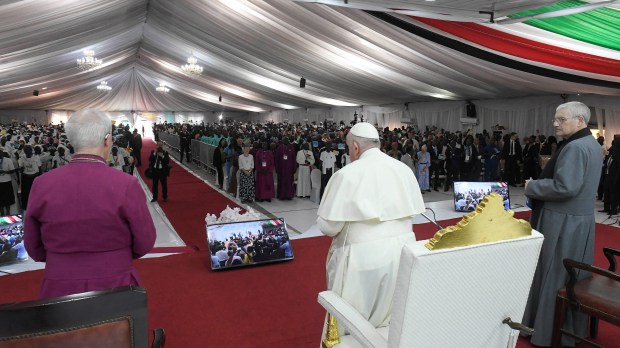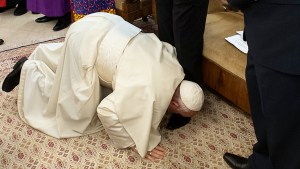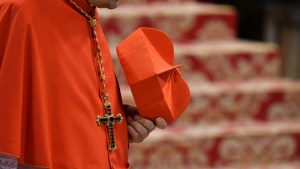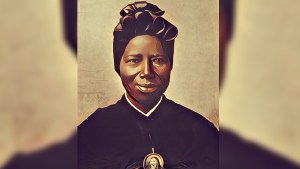Among the names of the 21 cardinals to be created by Pope Francis on September 30, that of Stephen Ameyu Martin Mulla, archbishop of Juba (South Sudan), is undoubtedly the one most in keeping with the ‘peripheral’ appointments dear to the Argentine Pontiff. Archbishop Ameyu is the first cardinal of the world’s youngest country, which became independent in 2011.
It’s a land still plagued by division and conflict. Despite the tensions that have affected both his country and his life as a bishop, the future Cardinal Stephen Ameyu has never stopped calling for peace and reconciliation. [Photo above is from Pope Francis’ visit to South Sudan at the beginning of 2023.]
South Sudan gained its independence from Sudan in 2011 after two successive wars of independence. These conflicts left two million people dead and four million in exile. Between 2013 and 2020, South Sudan was then torn apart in several bloody civil wars, which claimed an as yet undetermined number of lives and exacerbated the misery of the population in this country, one of the poorest in the world.
Formation and priestly ministry
Born on January 10, 1964, in southern Sudan, Bishop Ameyu entered the minor seminary at the age of 14, before moving on to the major seminary at 19. He was ordained a priest for the Diocese of Torit on April 21, 1991. He then gained pastoral experience as vicar and parish priest in churches in Khartoum, Sudan’s capital. From 1993 to 1997, he went to Rome to study for a doctorate in dogmatic theology at the Pontifical Urban University. At the time, he was already advocating peace, as his thesis was titled “Towards religious dialogue and reconciliation in Sudan.”
Ameyu then returned to his homeland. There, he became a professor and then the rector of St. Paul’s Major National Seminary in Juba until 2000. He has held other teaching posts, as well as being a consultant and chaplain for various NGOs involved in non-violence, development, and support for women. Starting in 2013, he worked in the administrative offices of the Catholic University of South Sudan, becoming vice-director its Institute of Applied Research and Community Outreach (IARCO).
Sowing peace in the midst of discord
Pope Francis appointed Ameyu the bishop of Torit on January 3, 2019, and he received his episcopal ordination in March of the same year. Less than a year later, on December 12, Pope Francis appointed him Archbishop of Juba, the capital of South Sudan.
However, this appointment was not well received by a small group of lay people and priests in the African capital, which delayed his installation. This group, of around 10 people, rejected the appointment and even wrote a firm and threatening letter to the Vatican.
They claimed that the Holy See had been influenced by local officials and priests acting for their own personal interests, and that a local priest would have been preferable. Finally, they accused Bishop Ameyu of having at least six children. Many observers attributed this opposition to tribal quarrels. The perpetrators were Bari, the majority ethnic group in Juba, whereas Bishop Ameyu belongs to the Madi ethnic group.
Support from the Vatican and other authorities
A Bari organization and other South Sudanese bishops nevertheless condemned the letter and its authors. After a two-month investigation by the Vatican, Pope Francis reconfirmed Ameyu’s appointment as Archbishop of Juba in early March. But a few days later, at the height of the controversy, a group of Catholics attacked and injured a priest in charge of planning the installation.
Stephen Ameyu was finally installed as archbishop on March 22, 2019. The ceremony took place under tight security and was attended by President Salva Kiir and his vice-president and long-time rival Riek Machar. A vehicle struck the president’s motorcade on its way to the installation, but there were no serious injuries and the driver’s motives are unknown. “Let us pray that the devil who wants to separate us will be chased away,” said Bishop Ameyu during the installation Mass.
Tribalism: “the enemy of peaceful coexistence”
As Archbishop of Juba, Ameyu has never ceased to call for peace and reconciliation whenever he can, as when he encouraged Catholics to welcome their Sudanese brothers fleeing a new conflict in their country in April 2023. He has also called on several occasions to fight tribalism in his country, which generates a great deal of conflict and division. At a Mass in September 2022, he defined tribalism as “the enemy of peaceful coexistence” and “incompatible with faith.”
Archbishop Ameyu had the opportunity to welcome the Pope to the capital in February 2023 for a trip under the banner of reconciliation between the two Christian politicians at the head of the country, President Salva Kiir and his rival and Vice-President Riek Machar, whom Francis had received at the Vatican in April 2019, going so far as to kiss their feet to beg them to choose the path of peace.
The fruits of Pope Francis’ visit
“We are convinced that the ecumenical pilgrimage of His Holiness Pope Francis will crush the head of the devil who is delaying complete peace in South Sudan, because the faith of God’s children is stronger than evil,” said the future South Sudanese cardinal on the eve of this apostolic journey. The Pope made the visit jointly with the Anglican primate and the moderator of the Presbyterian Church of Scotland, and it met with great impact among the population of this predominantly Christian country.
A few months later, on receiving a visit from Cardinal Secretary of State Pietro Parolin in August 2023, Archbishop Ameyu expressed his delight at the emergence of “windows of opportunity for peace,” while acknowledging the patience required to reap the fruits of these efforts. “We are not prophets of doom. We would like to engage in discreet diplomacy,” the archbishop said, hoping that his country would be able to guarantee the organization of elections before the end of 2024.




